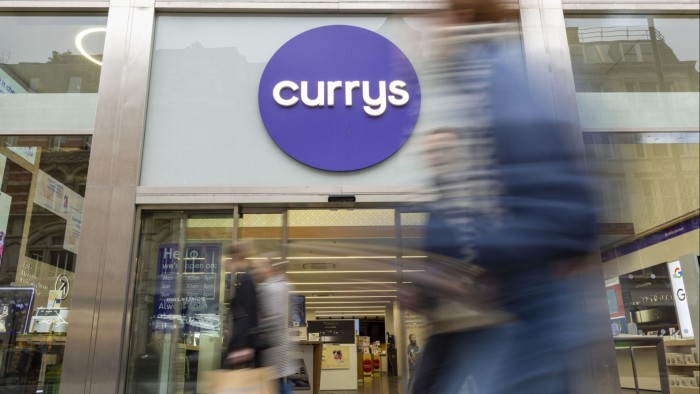Unlock the Editor’s Digest for free
Roula Khalaf, Editor of the FT, selects her favourite stories in this weekly newsletter.
Just over a year ago, UK electrical retailer Currys looked like a classic case of high street woes writ large. Now it is a cash flow positive business with an improving top line and a much improved share price. The trouble is that Currys is now an example of something else: the tendency for recovering retailers to find themselves permanently on probation.
Last week, the high street peddler of household appliances reported full-year sales up 3 per cent year-on-year. But its pre-tax profit grew by more than a third, helped by expanded margins as well as a drop in financing costs. Same-store sales at Currys’ UK business rose 4 per cent, while those at its Elkjøp stores across Nordic countries at least stopped shrinking.
Currys’ shares have nearly doubled since it was the subject of takeover interest from hedge fund Elliott Management and Chinese online retailer JD.com in February 2024. Boss Alex Baldock has closed underperforming stores and targeted recurring revenue, such as repair plans to accompany laptop purchases and offering in-store credit. In its UK unit, that kind of repeat business now makes up 28 per cent of Currys’ top line.
Yet it doesn’t take much to make a retailer wobble. On Monday, Currys’ shares fell almost 5 per cent, for one of their worst days in more than two years, after analysts at RBC lowered their investment recommendation, saying recent tax rises and a weakening economic backdrop made Currys less attractive. It added that there was better value elsewhere: airport outlet operator Avolta and discount retailer B&M both trade at price-to-earnings multiples well below their long-term averages, unlike Currys, and with fatter margins.
Currys’ performance over the past year suggests the company was right to hold its nerve when Elliott and JD came knocking. While Baldock and his team were deep into their turnaround efforts by that point, it’s only later that they started to pay off in earnest.
But recovery is a process, and Monday’s share-price fall shows investors are still skittish. Only this month Currys restored its dividend, suspended two years ago, and committed to a progressive series of payouts. Other excess cash will go towards buybacks, though at an unspecified future date. Speeding that process along might help investors — who have so far done well from the formerly troubled retailer — keep the faith.
